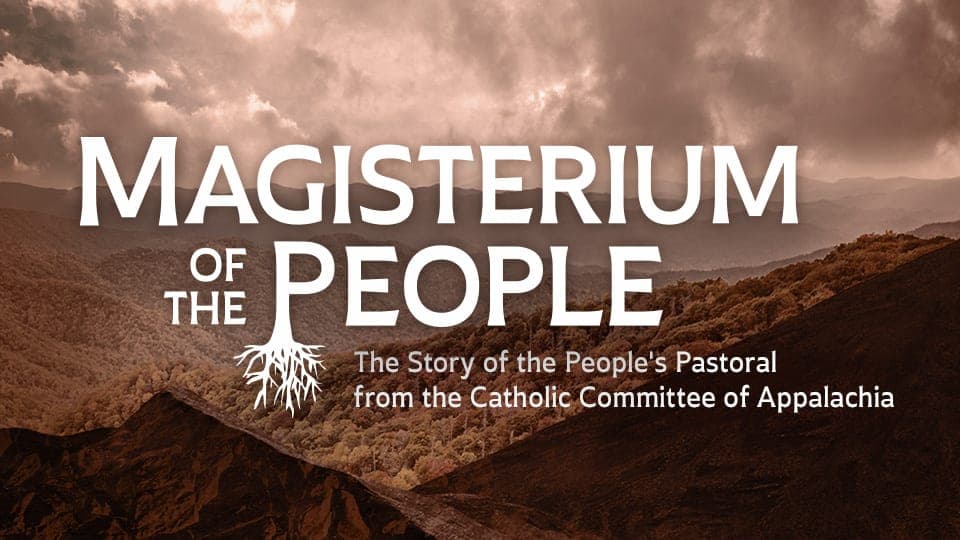NEW YORK — Forty years before Pope Francis released his landmark document Laudato si’ — calling for Catholics and all people of goodwill to exhibit greater care for creation — Catholics in the Appalachia region of the United States were releasing letters of their own, drawing attention to the destruction of their land and their communities.
In 1975, the Catholic bishops of Appalachia released “This Land is Home to Me,” in which they highlighted the powerlessness of the people of Appalachia in a region where corporations had come to control the land, and hence, the lifeblood of its people.
20 years later, in 1995, a follow-up “At Home in the Web of Life,” was published, in which Appalachian Catholics lamented the “culture of death” that had contributed to a depletion of their resources and heritage.
Now, the story of the people of Appalachia is told in a new documentary, Magisterium of the People: The Story of the People’s Pastoral from the Catholic Committee of Appalachia, chronicling the release of a third pastoral letter by the people of the region.
Whereas the original two letters were authoritative documents produced with the support of the bishops, the third letter, released in 2015, is a “people’s pastoral” attempting to speak directly from the trenches, rather than from the top down.
Produced by Salt and Light Catholic Media Foundation, the 45-minute documentary introduces viewers to priests, religious sisters, and laity who work together in one of the poorest areas of the United States to not only fend for themselves but to provide for others.
While Appalachia, which stretches from the mountains of southern New York to northern Alabama and Georgia, has long been hailed for its natural beauty, its natural resources have been the envy of corporations and industries from around the world making it a prime target for those seeking to benefit from it.
Over the last seventy-five years, its mountains have been leveled, its evergreen forests cleared away, and its ground has been plundered, yielding profits in the billions for the coal and logging industries.
“Some people have really benefited by this, but many people have been left behind,” says Father John Rausch, who serves as a missionary priest in Eastern Kentucky and is interviewed in the film.
“If certain people admitted what was going on, they’d either have a conscience problem or they’d have to give it up,” he insisted.
Rausch’s voice is not the only one speaking out against a region that has experienced extreme poverty while at the same time witnessing the diminution of its abundant resources.
In tears, Jeannie Kirkhope surveys a once-wooded area now cleared away by logging companies. As she tearfully describes the one-time canopy of trees that surrounded the mountains that have now been cut down, she mourns the “bodies of friends” she has lost in the process.
Sister Beth Davies, a member of Congregation of Notre Dame, who moved to the region over 40 years ago to serve as a “listening presence” to individuals like Kirkhope who struggle to make sense of the loss of the land that has defined families for generations, says that the land “tells a story” and a major part of her religious vocation has been to listen to those who are telling it — and to make sure it is not forgotten.
Davies, Kirkhope, and Rausch are leaders within the Catholic Committee of Appalachia, and although they may be a minority within the region — making up less than one percent of the total population — they believe they have a prophetic message to offer.
Within the Committee, and in the new pastoral letter, they are guided by the question: “What is it like to be you in this place?” as the region attempts to muddle its way through the fears of “excluded voices” related to miner safety, black lung, fracking, and other ecological and health concerns brought about by the targeting of its resources.
For over four decades, this community on the peripheries of society has attempted to plead with their fellow neighbors and the lawmakers who represent them to make their voices heard.
While such efforts have delivered mixed results, they describe in the film the shot in the arm they’ve received since the election of Francis in 2013, and in particular, the validation they’ve felt since the release of his 2015 encyclical Laudato si’.
“The encyclical has allowed them to be proud of the earth and their connection to it,” Rausch maintains.
While environmental concerns have long been a top priority for Catholics in Appalachia, both in their own pastoral letter and now in the pope’s own writings, they believe they’ve found new momentum for their cause, and Magisterium of the People is a further attempt to put their efforts front and center.
“It’s always been something that if you have enough time for, you can do that,” Rausch says of efforts to care for creation. “Now, you have to recognize that God’s garden is in danger.”

















